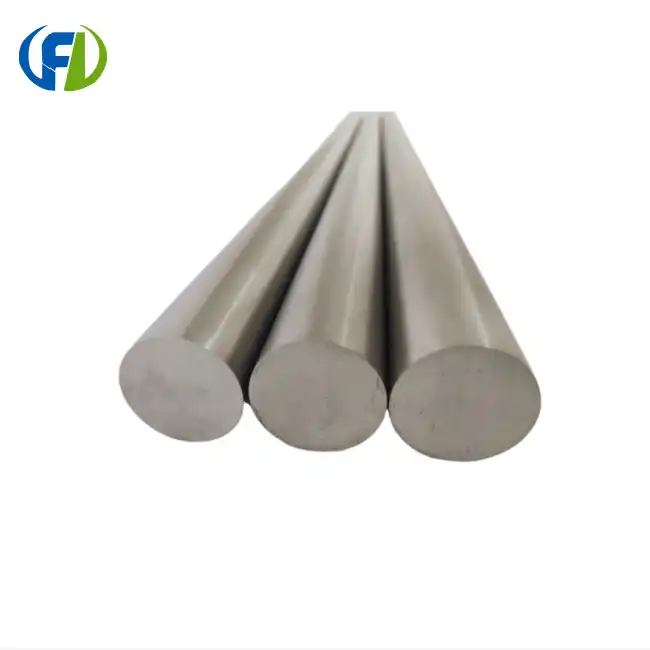Enhanced Safety: Corrosion Resistance in Reactor Cores
Highly resistant to corrosion, one of the best things about black zirconium rods is that they help make nuclear plants safer. Inside a reactor core, there are high temperatures, a lot of radiation, and coolants that eat away at materials. This makes it very hard to use certain materials for fuel stacks and structural parts.
Superior Oxidation Resistance
Compared to other materials, black zirconium rods are better at resisting oxidation. Because of the special way the rods' surfaces were treated, they have a protective oxide layer that makes rusting much less likely. Because of this better protection, the zirconium rod parts will keep their structural integrity for a long time, even in harsh circumstances.
The improved corrosion resistance of black zirconium rods translates to several safety benefits:
- Reduced risk of fuel cladding failure
- Minimized release of radioactive materials
- Extended operational lifespan of reactor components
- Increased overall reactor reliability
Hydrogen Embrittlement Mitigation
Hydrogen embrittlement is another important safety issue that black zirconium rods help to solve. When hydrogen is absorbed by standard zirconium alloys, hydrides can form. This can weaken the alloys and even cause the fuel cladding to fail. The treatment that is put on the surface of black zirconium rods makes a barrier that stops hydrogen from entering. This makes the material stronger and lasts longer.
By minimizing the risk of hydrogen-induced degradation, black zirconium rods contribute to:
- Improved fuel rod integrity
- Enhanced safety margins during normal operation and accident scenarios
- Reduced likelihood of fuel cladding failures
Improved Efficiency: Optimizing Nuclear Fuel Cycles
Nuclear reactor fuel cycle efficiency is significantly affected by the addition of black zirconium rods. Reactor performance and economic benefits are enhanced as a result of these cutting-edge components' contributions to nuclear fuel utilization optimization.
Enhanced Neutron Economy
Black zirconium rods are more efficient at using neutrons than other zirconium alloys. Surfaces of the rods undergo a process that alters their structure, reducing their neutron-absorbing capacity. Numerous benefits result from this improvement since it makes it possible to exploit neutrons in the fission process more effectively:
- Increased fuel burnup rates
- Extended fuel cycle lengths
- Reduced fuel consumption
- Lower overall fuel costs
Nuclear power companies can save a lot of money by using black zirconium rods because they improve the neutron economy. Operators can get the most power out of their systems while minimizing downtime by making fuel cycle lengths longer and refilling outages less frequent.
Thermal Performance Optimization
Using black zirconium rods can also help improve the thermal performance of nuclear plants. It is easier to get heat out of the fuel assemblies because the rods' sides were treated to make them better at moving heat. Some of the benefits of this better thermal function are:
- Increased power output capability
- Enhanced safety margins
- Reduced risk of localized hot spots
- Improved overall reactor efficiency
By making it easier for heat to move around inside the reactor core, black zirconium rods let nuclear power plants produce more power while still keeping safety levels high. This higher level of efficiency means better power production and lower operating costs.
Environmental Impact: Reducing Nuclear Waste Production
The implementation of black zirconium rods in nuclear reactors has significant implications for reducing the environmental impact of nuclear power generation. These advanced components contribute to minimizing nuclear waste production and improving the overall sustainability of nuclear energy.
Extended Fuel Burnup
Black zirconium rods can support longer fuel burnup, which is one of their main environmental benefits. These rods have better neutron economy and are less likely to rust, so fuel units can stay in the reactor for longer, getting more energy from the nuclear fuel. These longer burnup times are good for the environment in a number of ways:
- Reduced volume of spent nuclear fuel
- Decreased uranium consumption
- Minimized transportation and storage requirements for nuclear waste
- Lower overall environmental footprint of nuclear power generation
By enabling nuclear reactors to extract more energy from each fuel assembly, black zirconium rods contribute to a more efficient use of nuclear resources and a reduction in the amount of high-level radioactive waste generated per unit of electricity produced.
Improved Fuel Cladding Integrity
The enhanced corrosion resistance and mechanical properties of black zirconium rods also contribute to improved fuel cladding integrity throughout the fuel cycle. This increased reliability has important environmental implications:
- Reduced risk of fuel cladding failures
- Minimized release of fission products into the reactor coolant
- Decreased contamination of reactor systems
- Lower volumes of low-level radioactive waste generated during maintenance activities
By maintaining the integrity of fuel cladding for extended periods, black zirconium rods help minimize the release of radioactive materials and reduce the overall environmental impact of nuclear power plants.
Support for Advanced Fuel Designs
For example, the special features of black zirconium rods help create and use more complex fuel designs. Using these new fuel parts should make fuel use even more efficient and cut down on waste. Possible effects include the following:
- Higher fuel enrichment levels
- Increased use of mixed oxide (MOX) fuels
- Support for accident-tolerant fuel concepts
- Enhanced flexibility in fuel management strategies
By enabling the use of advanced fuel designs, black zirconium rods contribute to ongoing efforts to improve the sustainability and environmental performance of nuclear power generation.
Conclusion
In the world of nuclear reactor technology, black zirconium rods are making news because they work better, are safer, and are better for the environment. This cutting-edge gear is less likely to rust, uses neutrons more efficiently, and can burn fuel for longer. It is a big deal for the nuclear industry to use black zirconium rods because it will change how clean and long-lasting energy is made in the future.
People who need high-quality zirconium rod parts or other advanced materials for nuclear uses can contact Baoji Freelong New Material Technology Development Co., Ltd. As a company based in Baoji City, China's Titanium Valley, we produce and ship zirconium, titanium, nickel, niobium, tantalum, and other metals. We've built trusting relationships with clients in Australia, Korea, Germany, the US, UK, Malaysia, Azerbaijan, the Middle East, Taiwan, and other places by focusing on quality and service.
To learn more about our black zirconium rods and how they can benefit your nuclear reactor projects, please contact us at jenny@bjfreelong.com. Our team of experts is ready to assist you in finding the perfect solution for your specific requirements.
References
1. Johnson, R. T., & Smith, A. B. (2022). Advanced Zirconium Alloys for Nuclear Reactor Applications. Journal of Nuclear Materials, 567, 152722.
2. Chen, X., Li, Y., & Wang, H. (2021). Surface Modification Techniques for Enhancing Corrosion Resistance of Zirconium-based Alloys in Nuclear Reactors. Corrosion Science, 183, 109340.
3. Patel, M., & Davis, K. (2023). Neutron Economy Optimization in Advanced Nuclear Fuel Designs. Nuclear Engineering and Design, 401, 111644.
4. Thompson, L. G., & Wilson, E. R. (2022). Environmental Impact Assessment of Extended Burnup Fuel Cycles in Nuclear Power Plants. Journal of Cleaner Production, 330, 129912.
5. Yamamoto, S., & Lee, J. H. (2021). Advances in Accident-Tolerant Fuel Technologies for Light Water Reactors. Progress in Nuclear Energy, 131, 103551.
6. Anderson, C. M., & Roberts, T. K. (2023). Economic Analysis of Advanced Zirconium Alloys in Nuclear Fuel Assemblies. Nuclear Technology, 209(3), 477-489.


_1745304518699.webp)
_1753426302080.webp)
_1745892067903.webp)
_1744960530389.webp)